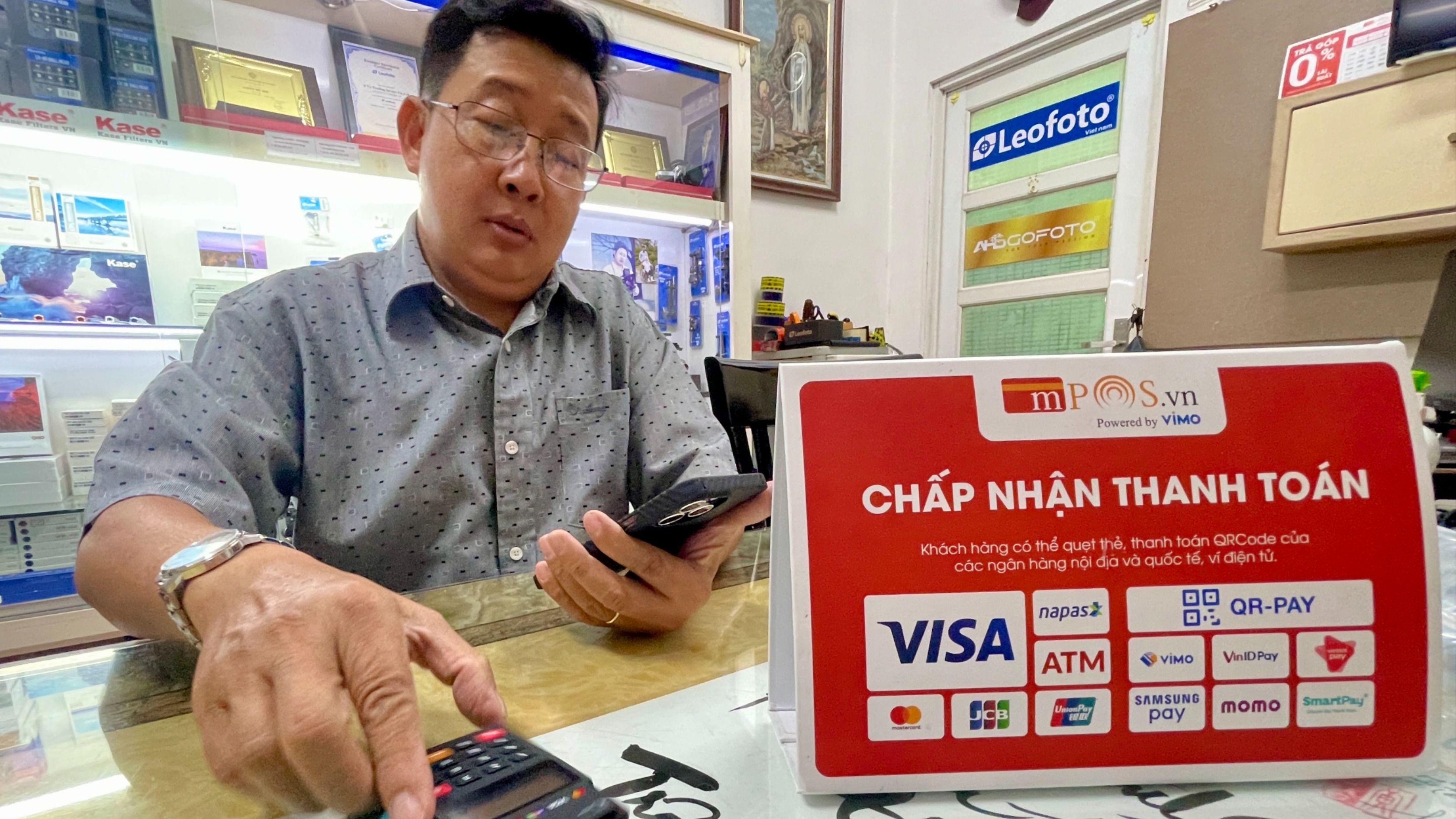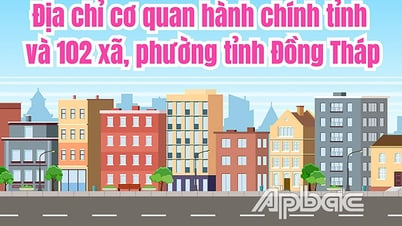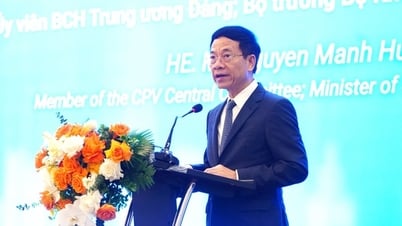The fact that a customer's credit card debt at Eximbank jumped from 8.5 million VND after 11 years to 8.8 billion VND attracted special attention from the public. Many people were startled, checked and discovered that they were also in the "debtor" situation without even knowing it...
 |
| Credit card payment for customers at a camera store in District 3, Ho Chi Minh City. Photo: HOANG HUNG |
Double-edged sword
Credit cards with the “spend first, pay later” feature and many attractive incentives are a convenient and safe means of payment, but they also contain many risks if users do not understand the terms of use and the “matrix” of interest and fees incurred. Mr. Le Minh (District 3, Ho Chi Minh City), owner of a small lubricant business, said he has 2 personal credit cards with a limit of 300 million VND/card.
To avoid the credit card debt trap, he registered for automatic credit card debt deduction and set up a reminder to pay the debt on time. However, not everyone is as knowledgeable as Mr. Minh. Four years ago, Ms. M. Hoa (District 7, Ho Chi Minh City) opened a credit card to "support" Eximbank employees in achieving their targets even though she did not need it. At that time, the employee said she did not have to pay any fees, so she did not pay attention.
“Then I changed my phone number and moved, so I didn’t receive any messages or notifications from the bank. Now I checked and found out that I owe 3.6 million VND in annual fees for 3 years because only the first year is free. I reluctantly paid the debt and closed the card because I was afraid that one day I would become a billion-dollar debtor,” said Ms. Hoa.
The director of a card center at a bank in Ho Chi Minh City said that many customers have credit cards from different banks, so they cannot manage them. Some people, when applying for a loan, discovered that they had bad debt from a credit card from another bank on the National Credit Information Center (CIC) system.
Increase accountability from both sides
According to Dr. Huynh Trung Minh, a financial expert, when spending within the limit, the cardholder will be exempted from interest for an average of 45-55 days. After this period, in addition to paying the entire outstanding balance to be exempted from interest, the cardholder can pay the minimum outstanding balance (about 5% of the amount spent during the period), but the remaining unpaid debt will be charged an interest rate of 18%-40%/year (depending on the bank) and will be added to the next payment period. If payment is not made on time, the cardholder will have to pay interest, including overdue interest, equal to 150% of the normal interest rate, and late fees, exceeding the limit are also very high.
“Even if the card is not used, it still incurs fees. If the payment is not made on time, these interest and fees will be compounded daily, monthly, and yearly, so the total outstanding balance will increase very high. In addition, credit cards also bear many other types of fees such as: ATM cash withdrawal fees; foreign currency conversion fees when swiping the card abroad, fees for exceeding the limit... The case of a customer being asked for 8.8 billion VND is a warning to increase responsibility from both the bank and the customer. Customers need to understand credit cards clearly to avoid risks," Dr. Huynh Trung Minh advised.
On the management side, Mr. Nguyen Duc Lenh, Deputy Director of the State Bank of Vietnam (SBV) Ho Chi Minh City branch, said: “A credit card is essentially a loan without interest for a certain period of time, so customers must be responsible for repayment according to the provisions of Circular 39/2016 of the SBV. On the part of commercial banks, after issuing the card, they need to monitor and urge customers as if it were a loan to help customers use the card effectively and limit the occurrence of overdue debt, which affects customers”. Dr. Dinh Trong Thinh, lecturer at the Academy of Finance, requested that the case be handled promptly, so as not to lose consumer confidence in payment services, while the Government is asking the SBV to promote non-cash payments.
| * Attorney TRUONG THANH DUC, Director of ANVI Law Firm: Must unify general regulations on interest rates According to the Civil Code, the loan interest rate is agreed upon by the parties but must not exceed 20%/year, unless otherwise provided by other relevant laws. When adding overdue interest, it must not exceed 30%/year. According to the Penal Code, lending at an interest rate of over 100% is considered usury. However, the above ceiling of 20% does not apply to banks, so the bank's lending interest rate can be up to any number without being considered illegal. Next, overdue interest, instead of only being added up to 10% as generally prescribed, is equal to 150% of the interest rate within the term. In the case of Eximbank mentioned above, they may apply compound interest, compound interest, cumulative interest, interest added to principal, calculated monthly, so the jump from 8.5 million VND to 8.8 billion VND is completely possible, if applying the overdue debt interest rate of about 70%/year. The interest, penalty interest and fees that customers must pay are all agreed upon in the loan or card contract. However, many times customers do not read, or when they read, they do not understand. Therefore, it is time to amend the law, apply uniform regulations on loan interest rates to all economic sectors, in a fair, equal and reasonable manner. |
According to sggp.org.vn
.
Source






![[Photo] President Luong Cuong receives Speaker of the New Zealand Parliament Gerry Brownlee](https://vphoto.vietnam.vn/thumb/1200x675/vietnam/resource/IMAGE/2025/8/29/7accfe1f5d85485da58b0a61d35dc10f)




























































































Comment (0)